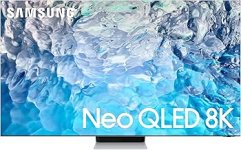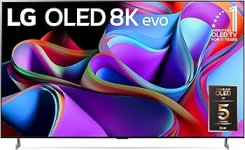cullypants
New member
Catalogs Hide
- 1 Specs
- 2 Which to get
When it comes to premium television technology, two heavyweights are vying for the top spot: the Samsung QN900B and the LG OLED77Z3PUA. Each model presents a compelling case for why they deserve to be your next entertainment centerpiece, but they do so in fundamentally different ways.
On one hand, the Samsung QN900B boasts its Infinity Screen and the Quantum Matrix Pro with Mini LEDs, promising a visual experience that claims to push the boundaries of color and contrast. The Neural Quantum Processor 8K aims to elevate your viewing pleasure by utilizing advanced AI to deliver stunning upscaling and immersive sound.
Conversely, the LG OLED77Z3PUA takes a more traditional approach with its self-lit pixels, which provide rich colors and deep blacks, making it a favorite for cinephiles who prioritize picture quality. With its Brightness Booster Max, it claims to achieve brightness levels that challenge the perception of OLED limitations.
So, which technology reigns supreme? Is the innovative approach of Samsung worth the potential drawbacks of its edge-lit design, or does LG’s reliance on self-lit pixels deliver a more authentic viewing experience? Let’s dive into the specifics and see how these two TVs stack up against each other.
I'm in the market for a new TV and caught between the SAMSUNG QN900B and the LG OLED77Z3PUA. Both sound incredible, but I could use some help deciding based on a few key factors.
First off, picture quality. The Samsung boasts this Infinity Screen and Quantum Matrix Pro tech, which sounds like it could deliver some crazy detail with those mini LEDs. On the flip side, the LG has self-lit pixels with 100% Color Volume, which I think means amazing color accuracy and contrast. Has anyone seen a side-by-side comparison or have thoughts on which one really pops more?
Then there's sound quality. The Samsung mentions Atmos sound, but how does that stack up against the LG's overall audio experience? Do I need to invest in a soundbar for either, or are they good on their own?
As for the system, I’m curious about the user interface and smart features. I've heard mixed things about Samsung's Smart Hub. Is it smooth and intuitive? Does the LG have a better setup for streaming and apps?
Lastly, are there any potential downsides to either model? I’ve read that OLEDs can have burn-in issues, while I've heard some say that Samsung’s processing might not be as good as OLED for certain content.
Thanks for any insights you can share!
On one hand, the Samsung QN900B boasts its Infinity Screen and the Quantum Matrix Pro with Mini LEDs, promising a visual experience that claims to push the boundaries of color and contrast. The Neural Quantum Processor 8K aims to elevate your viewing pleasure by utilizing advanced AI to deliver stunning upscaling and immersive sound.
Conversely, the LG OLED77Z3PUA takes a more traditional approach with its self-lit pixels, which provide rich colors and deep blacks, making it a favorite for cinephiles who prioritize picture quality. With its Brightness Booster Max, it claims to achieve brightness levels that challenge the perception of OLED limitations.
So, which technology reigns supreme? Is the innovative approach of Samsung worth the potential drawbacks of its edge-lit design, or does LG’s reliance on self-lit pixels deliver a more authentic viewing experience? Let’s dive into the specifics and see how these two TVs stack up against each other.
Specs
| Parameter | SAMSUNG QN900B Series TV | LG OLED77Z3PUA TV |
|---|---|---|
Picture | ||
Screen Size | 74.5 Inches | 77 Inches |
Reference Price | $3299 | $9996.99 |
Model Year | 2022 | 2024 |
Specific Uses | Home Viewing | Entertainment, Gaming |
Highlight | INFINITY SCREEN W/ SLIM ONE CONNECT: Escape into the nearly edge-to-edge screen; The Samsung Neo QLED 8K features the expansive Infinity Screen with a near-invisible bezel and the Attachable Slim One Connect that keeps your cables out of sight QUANTUM MATRIX PRO W/ MINI LEDS: Experience out-of-this-world detail on a screen made brilliant by a universe of tiny lights; With Quantum Matrix Technology Pro, a staggering grid of Samsung's own Quantum Mini LEDs unleash a billion colors with ultra-fine precision for intense contrast NEURAL QUANTUM PROCESSOR 8K: Behind the scenes, the ultra-high performance 8K processor uses 20 neural networks to deliver our most immersive picture yet, with intuitive Smart Hub controls, Atmos sound, exquisite 8K upscaling and more* | SELF-LIT PIXELS: LG's signature OLED technology creates an incredible watching experience and stellar picture quality illuminated with over 8 million self-lit pixels. Take in rich and accurate colors from the brightest to darkest parts of the scene thanks to 100% Color Volume* and with 100% Color Fidelity. 8K RESOLUTION: LG OLED 8K TV brings details to life on our highest resolution OLED TV. Instantly transform all your regular and 4K content into an 8K-like viewing experience. BRIGHTNESS BOOSTER MAX: Discover the new height of bright, vivid picture. The LG OLED evo Z3 shines stronger thanks to Brightness Booster Max technology that magnifies each individual pixel for luminous quality that shines with every detail. |
Operating System | Samsung Tizen™ | WebOS |
Internet Applications | Apple TV+, Samsung TV Plus, Netflix, YouTube, Prime Video, Disney+, Hulu, Xbox, Nvidia GeForce NOW, ESPN and Max | Disney Plus, HBO Max, Netflix, Prime Video, Apple TV and more. |
Remote Control | Voice Control | - |
Controller Type | Voice Control | Remote Control, App Control, Voice Control |
Control Method | Remote | Voice |
Aspect Ratio | Unknown | 1.77:1 |
Display Technology | QLED | OLED |
Screen Finish | Flat | Flat |
Has Color Screen | Yes | - |
Resolution | 8K | 8K |
Refresh Rate | 120 Hz | 120 |
Response Time | - | 0.1 Milliseconds |
HDR Format | HDR10 | HLG, HDR10, Dolby Vision |
Backlight Technology | - | Self-Luminous |
Backlight Setting | - | Pixel Dimming |
Picture Enhancement | Quantum Matrix Technology Pro, Neural Quantum Processor 8K | a9 AI Processor 8K Gen6 |
Motion Enhancement | [INFERRED] Motion Enhancement Technology | OLED Motion |
Audio Channels | 6.2.4 | 4.2 |
Audio Encoding | Dolby Atmos | - |
Audio Output | Surround | - |
Audio Input | USB, HDMI | HDMI, USB, Optical |
Speaker Description | Surround | Dolby Atmos, Down Firing, 4.2 Channel, AI Sound Pro |
Surround Sound | Dolby Atmos | DTS:X, Dolby Atmos |
Video Encoding | HEVC (High Efficiency Video Coding or H.265) | HEVC, AV1 |
Screen Mirroring | - | AirPlay 2 |
Compatible Devices | Soundbars, Streaming Devices, Gaming Consoles | Smartphone |
Tuner Type | ATSC | ATSC |
Voltage | 120 Volts | - |
Line Voltage | - | 100-240 VAC 50-60 Hz |
Other Features | 100% Color Volume with Quantum Dot; Real Depth Enhancer; HDR10+; Works with Google Assistant and Alexa, Quantum Matrix Technology; Neural Quantum Processor 8K; Motion Xcelerator Turbo Pro; Quantum HDR 64x | Built-In Speaker, Nvidia G Sync, Game Mode, Flat, Amd freesync |
D x W x H | 12.5"D x 65.1"W x 40.1"H | 12.7"D x 67.6"W x 41.1"H |
Connectivity Technology | Bluetooth, Wi-Fi, USB, Ethernet, HDMI | Bluetooth, Wi-Fi, USB, Ethernet, HDMI |
Bluetooth Version | - | 5.1 |
Wireless Technology | Bluetooth, Wi-Fi | Bluetooth, Wi-Fi |
Usb Ports | 3 | 3 |
HDMI Ports | 4 | 4 |
Connector Type | USB, HDMI | USB, RS232C, Optical, Ethernet, HDMI |
Signal Format | Digital | Digital (ATSC) |
Which to get
Hey everyone.I'm in the market for a new TV and caught between the SAMSUNG QN900B and the LG OLED77Z3PUA. Both sound incredible, but I could use some help deciding based on a few key factors.
First off, picture quality. The Samsung boasts this Infinity Screen and Quantum Matrix Pro tech, which sounds like it could deliver some crazy detail with those mini LEDs. On the flip side, the LG has self-lit pixels with 100% Color Volume, which I think means amazing color accuracy and contrast. Has anyone seen a side-by-side comparison or have thoughts on which one really pops more?
Then there's sound quality. The Samsung mentions Atmos sound, but how does that stack up against the LG's overall audio experience? Do I need to invest in a soundbar for either, or are they good on their own?
As for the system, I’m curious about the user interface and smart features. I've heard mixed things about Samsung's Smart Hub. Is it smooth and intuitive? Does the LG have a better setup for streaming and apps?
Lastly, are there any potential downsides to either model? I’ve read that OLEDs can have burn-in issues, while I've heard some say that Samsung’s processing might not be as good as OLED for certain content.
Thanks for any insights you can share!





